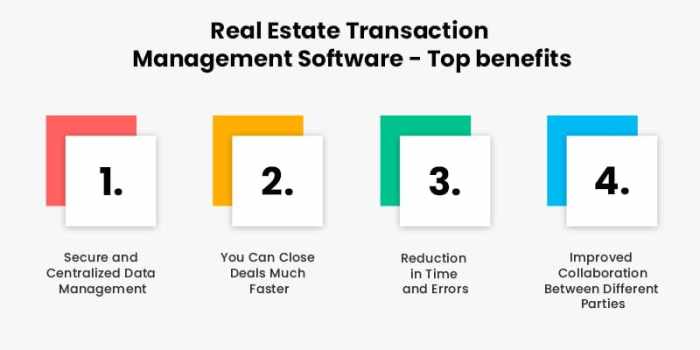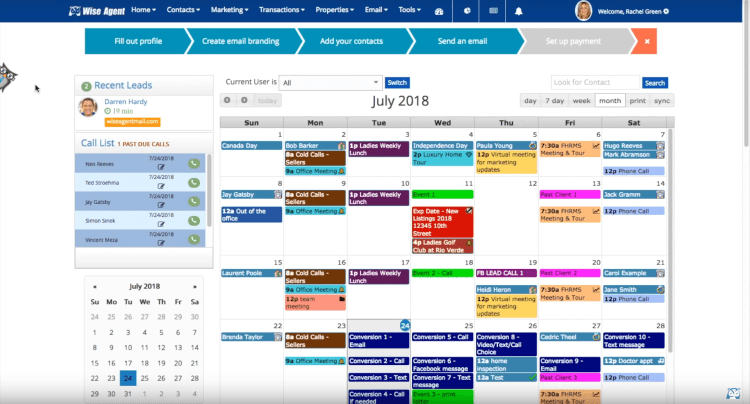Transaction management software for real estate brokers streamlines the complexities of real estate deals. It offers a centralized platform for managing client interactions, tracking progress, and ensuring compliance, ultimately boosting efficiency and reducing errors.
This software is designed to handle every stage of a real estate transaction, from initial contact to closing. Features such as automated reminders, document management, and communication tools help brokers stay organized and on top of deadlines.
Real estate brokerage is a complex and dynamic industry, demanding meticulous record-keeping, efficient communication, and streamlined workflows. Transaction management software for real estate brokers has emerged as a crucial tool, transforming how agents handle deals from start to finish. This comprehensive guide delves into the benefits, features, and considerations for implementing such software, empowering real estate professionals to maximize productivity and profitability.
Understanding the Need for Transaction Management Software
Traditional methods of managing real estate transactions often involve scattered documents, multiple email chains, and fragmented communication. This can lead to errors, delays, and lost opportunities. Transaction management software (TMS) addresses these challenges by providing a centralized platform for all transaction-related activities. It streamlines communication, automates tasks, and provides a secure repository for crucial documents. This centralized approach fosters greater transparency and accountability, benefiting both the broker and the client.
Key Benefits of Transaction Management Software
- Enhanced Efficiency: Streamlined workflows automate tasks, reducing manual effort and speeding up transaction processing.
- Improved Communication: Centralized communication channels keep all stakeholders informed and prevent crucial information from getting lost.
- Reduced Errors: Automated reminders and document tracking minimize mistakes, improving accuracy.
- Increased Transparency: Clients can access important information easily, fostering trust and satisfaction.
- Data Security: Secure platforms protect sensitive client data, aligning with industry regulations.
Key Features of Effective Transaction Management Software: Transaction Management Software For Real Estate Brokers
A robust transaction management system should offer a comprehensive suite of features. These typically include:
Document Management & Storage
Securely storing all relevant documents, including contracts, appraisals, and closing statements, in one centralized location is paramount. Version control and audit trails are also crucial.
Communication & Collaboration Tools
Facilitating seamless communication between all parties involved is vital. Features like email integration, internal messaging, and automated reminders are key components.
Automated Task Management
Automating tasks such as sending reminders, tracking deadlines, and generating reports can significantly reduce administrative burden.
Reporting & Analytics
Generating insightful reports on transaction performance and identifying areas for improvement is essential for optimizing real estate strategies.
Choosing the Right Transaction Management Software
Selecting the right software requires careful consideration of the brokerage’s specific needs and budget. Factors to consider include the size of the brokerage, the volume of transactions, and the required level of customization.
Factors to Consider When Choosing TMS, Transaction management software for real estate brokers
- Scalability: The software should be able to adapt to the growing needs of the brokerage.
- User-Friendliness: The software should be intuitive and easy to navigate for all users.
- Integration Capabilities: Integration with existing CRM and accounting systems is essential.
- Customer Support: Responsive and helpful customer support is crucial for addressing any issues.
- Pricing: The cost of the software should align with the brokerage’s budget.
Real Estate Transaction Management Software: Case Studies & Examples
Several real estate brokerage firms have successfully implemented transaction management software to streamline their operations and improve profitability. Case studies showcasing successful implementations can provide valuable insights.
Frequently Asked Questions (FAQ)
- Q: How much does transaction management software cost?
A: Pricing varies greatly depending on the features, number of users, and vendor. Contacting vendors directly is recommended to discuss pricing options.
- Q: Is transaction management software suitable for small real estate brokerages?
A: Absolutely! Many user-friendly and affordable options are available for small brokerages, streamlining operations and reducing errors.
- Q: How can I integrate my existing CRM with transaction management software?
A: Many transaction management platforms offer integrations with popular CRMs, allowing for a seamless data flow.
- Q: Can transaction management software improve client satisfaction?
A: Improved communication and transparency through the software directly contribute to enhanced client satisfaction.
Conclusion & Call to Action
Transaction management software is a game-changer for real estate brokers, providing a comprehensive solution for managing all aspects of a transaction. By streamlining processes, improving communication, and reducing errors, real estate professionals can focus on building relationships and closing deals effectively. Implementing the right TMS can dramatically enhance efficiency, boost profitability, and elevate the client experience. Ready to elevate your real estate business?
Contact us today for a free consultation and discover how transaction management software can revolutionize your operations.
Sources: (Insert links to reputable real estate technology websites, industry reports, or software vendor websites here)
In conclusion, transaction management software empowers real estate brokers to manage transactions more effectively. By automating tasks, improving communication, and reducing paperwork, this technology can significantly enhance productivity and profitability for real estate professionals. The future of real estate brokerage likely hinges on the skillful use of such tools.
FAQ Guide
What are the typical costs associated with transaction management software for real estate brokers?
Pricing varies greatly depending on the specific features offered and the number of users. Some programs offer tiered subscription models, while others charge per transaction or on a per-user basis. It’s essential to carefully evaluate the features and costs to find a solution that best suits your brokerage’s needs.
How does the software integrate with existing real estate platforms?

Source: cloudfront.net
Many transaction management systems integrate with popular CRM platforms and other real estate software, allowing for seamless data flow and reducing the need for manual data entry. This integration significantly improves workflow efficiency.

Source: leadcity.com
What security measures are in place to protect sensitive client data?

Source: softwareconnect.com
Reputable transaction management software providers prioritize data security with robust encryption and access controls. These measures are critical for protecting client confidentiality and adhering to relevant regulations.
Can the software be customized to meet specific brokerage requirements?
Some software providers offer customization options to tailor the platform to unique brokerage needs and workflows. This level of customization allows brokers to fully integrate the software into their existing procedures.